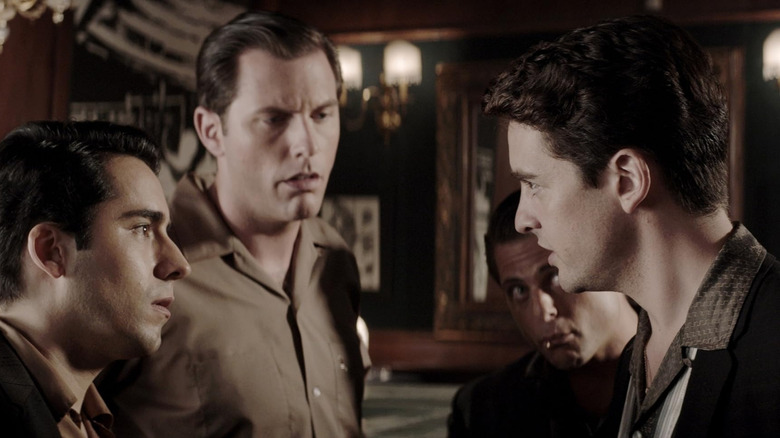Musicals are practically scientifically engineered to lift your spirits. Plots be damned, you can’t help but feel a little elated after two-plus hours of watching people cut a rug while singing about their innermost feelings. It’s a fundamental principle that allowed Broadway titans like Stephen Sondheim and Andrew Lloyd Webber to reimagine tragic love stories and gothic horror thrillers as crowd-pleasing spectacles about murder, revenge, and, most terrifying of all, having to deal with a needy, egotistical lead actor. Even when they end in sorrow and despair, you still leave the theater humming their catchiest earworms on an endorphin high (or, if you’ve only just watched “Cats” for the first time, perhaps a different sort of high).
What happens, then, when you hire the authority on cinematic melancholy that is 21st century Clint Eastwood to turn your Broadway smash into a movie? You get “Jersey Boys,” possibly one of the most downbeat and dour musicals ever committed to the screen. If you ever wondered whether “Mystic River” or even “Million Dollar Baby” might be just a tad less depressing if their characters sang about their emotions in between the moments of anguish, loss, and turmoil, the answer, judging by the results here, is … not really. Still, while it’s not hard to grasp why “Jersey Boys” was a flop upon its release in 2014, that same somberness also makes it one of a kind in the modern movie musical landscape.
Eastwood’s Jersey Boys is an anti-Broadway crowd-pleaser
Eastwood’s grounded, somber depiction of 1960s rock ‘n’ roll sensation The Four Seasons’ rapid ascension to fame and the good (and especially the bad) times that followed is truer to its source material than you might suspect. The original jukebox Broadway musical written by Rick Elice and Marshall Brickman (yes, as in the Oscar-winning “Annie Hall” co-writer) eschews the idea of being a fantastical portrayal of the band’s story, presenting itself as something akin to a live theater documentary. In keeping with that, the Man With No Name generally avoids the kind of flights of fancy you’d find in a biopic musical like “Rocketman.” Instead, almost all of the songs are diegetic and presented in a realistic light (the end credits aside), whether it’s the Seasons singing live in sequences that Eastwood and his trusty cinematographer Tom Stern tone done by shooting with their typical steady, unfussy coverage and subdued black-and-brown color palette or the group’s music being used as the soundtrack for montages, many of which tend to focus on the more doleful beats in the band’s story.
What you end up with is a movie that plays a little like a bummer version of “That Thing You Do!” … and that’s even before the Seasons’ breakout success (thanks to all-timer pop classics like “Sherry” and “Big Girls Don’t Cry”) is sullied by the band’s in-fighting, mob debts, and familial hardships. But where Tom Hanks’ musical dramedy about a fictional ’60s band sky-rocketing up the Billboard charts mostly manages to offset its cutesy nostalgia with more sobering moments, Eastwood’s relentlessly gritty approach clashes with the scenes where “Jersey Boys” wants to be more light-hearted and charming. Most folks agree on this point too, as evidenced by the film’s Rotten Tomatoes ratings (51 percent from critics, with the audience score only a bit higher at 62 percent) and disappointing box office turnout ($67 million worldwide against a $40 million budget).
Still, with its soulful music, themes of flawed masculinity, and a wistful story about the price that comes with a lifetime spent in the spotlight, “Jersey Boys” is certainly as personal as anything else Eastwood has ever directed. Despite its missteps, it even succeeds as, essentially, an anti-Broadway crowd-pleaser and that all too rare specimen of a musical that may actually leave you feeling more despondent than you did going in. (Y’know, if that’s your thing.)










